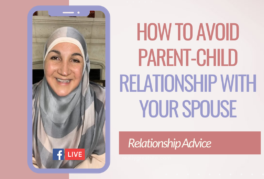Have you ever witnessed that parent-child dynamic in relationships where one spouse seizes the role of a parent while the other is treated like a child? Unfortunately, whether it be in your family, your circle of friends, or even in your relationship, such unnatural and possibly toxic forms of relations do occur, ultimately leading both parties involved to harm’s way.
Initially, it may seem like a beautiful and cool thing when being “taken care of,” however, as we know, all good things may come to an end. Being nagged and pointed at all the times may end you up with irritation, resentment as well as a ton of frustration.
On the contrary, the ones playing the elderly role may be getting a sense of value in their existence; they feel important and needed.
There may be varying reasons behind the appearance of this parent-child dynamic in relationships, such as one being more proficient in religion than the other, more experienced, age gaps, or irresponsible and incompetent spouse.
Today, we’ll look into the reasons behind the appearance of the above-mentioned parent-child relationship dynamic, why it may lead to disastrous and unhealthy consequences, and how you can avoid all of that and build yourself a peaceful and happy marriage, where both couples act as equals, just like the front wheels of a car. Without further ado, let’s pull the gears, and here we go!
Why is the Parent-Child Relationship dynamic being Unhealthy for Couples?
In the beginning, both parties may enjoy being in this strange relationship dynamic; one may feel comfortable being taken care of while the other may find it fun playing the caretaker role.
Unfortunately, though, there is no permanent banquet in the world. As time passes by, both parties may end up with a sense of resentment towards each other. Here, the parent role may feel like doing all the work while the other party eats soft meals all day long.
On the other hand, the child may complain about not being listened to, hate not being taken seriously, and being treated like a kid.
The first may say, “You never follow up on your tasks and have no sense of responsibility towards anything. So you don’t do this, or you didn’t do that one the right way.”
And the second may put it like, “You want to treat me like a child? Well, I’m going to start acting like a child then.”
And also things like, “Stop being bossy, stop nagging me all the time and for God’s sake, stop telling me what to do!”
Reasons Behind the Appearance of the Parent-Child Dynamic:
Ever heard the phrase, “There’s a reason for everything that happens”? Well, the same is the case with the parent-child dynamic in marriages. The following are the most common of those group of reasons:
One Is More Religious Than the Other:
As the name suggests, there may be marriages where one partner, whether the man or the woman, is more proficient in religious practices than the other, giving birth to a sense of looking up to in the heart of the less proficient partner, ending up in a dynamic.
More Experienced:
Knowledge and experience often lead to a sense of arrogance and overconfidence. If a spouse is well-versed in certain aspects such as religion, finances, or home management, they may develop this habit of pointing at their spouse whenever there’s a “mistake” or error in their way of doing things, etc. Of course, both ways may be correct at times, and all that inconvenience may be because of a difference in opinions.
Age Gap:
There are many couples with a relatively large age gap between each other. For example, the male in the marriage may be around 25 years old while the female is 18 or 20. Not always, but in many cases, older age equals more knowledge and wisdom, thus leading to the partner whose scale is heavier in years to treat their spouse like a child.
Incompetent and Irresponsible Spouse:
Often, some spouses are incompetent and irresponsible towards their duties to their partner, kids, home, and even themselves. Under such circumstances, somebody has to bear the mantle of teaching these helpless partners some discipline, right? And who is better qualified to take on the job than their spouse?
Simply put, whenever a spouse doesn’t make good on their promises or is lazy and irresponsible towards their duties, such a strange dynamic builds up where the relatively mature and responsible partner starts acting like a parent and disciplines their child-like spouse.
Parent-Child Relationship Dynamic Behind the Scenes:
Let’s pick up an analogy to help you better understand this parent-child relationship dynamic.
Suppose you have a couple of kids, both are in school. However, one kid is responsible, does homework and assignments on time without your supervision, and thus, is always trusted by you to do the right thing.
However, the other kid is irresponsible, pays no attention to homework, and messes up with other kids at school until you finally decide that it’s time to step in and micro-manage things. This child of yours may resent you since he always ends up as the target of your scolding and lecturing.
It’s not like you’re in love with the nagging business, are you? You would instead prefer things to go on auto-pilot as with the first kid. But reality doesn’t allow it.
Some parents like to get too involved in their kid’s matters, but generally, people would prefer their kids to take charge themselves as the parents already have quite a lot of things on their plate.
The same is the case in a parent-child dynamic in a relationship. It may not necessarily be enjoyable to act like a father or a mother to the spouse. Still, one adopts this role out of helplessness due to the other party’s childish and irresponsible behavior.
How this Toxic Relationship Leads Couples to Disasters?
In a toxic parent-child dynamic, the parenting side may become bossy, condescending and develop a love for setting rules and guidelines. And when those rules are broken, and the guidelines aren’t followed? Then, they start reprimanding, scolding, and bombarding their spouse with tons of lectures.
Initially, the child role may like being treated that way, but after some time, they feel as if their bottom lines are being pressed, and because of that, they start showing passive-aggressive behavior. They may deliberately ignore the guidelines, not pick up your phone calls and turn dead ears to all the nagging, scolding, and lecturing you throw their way.
Child figures may start seeing their bossy spouse as an authority figure and feel they need to oppose and rebel as nobody likes overboard nagging and scolding. So they may say it like, “My spouse seems like my father or my mother, yelling and pointing me in directions all the time.”
Things may stay as stable for a few years but not always! So the resentment keeps boiling until one day, BOOM! They rebel! And rebel in a massive way for sure.
And once this side gets fed up with being agreeable and submissive and chooses to rebel, things can escalate even up to a divorce!
How to Get Out of the Parent-Child Relationship Rut?
If your spouse parented you, how does that feel? What makes you become the child in a relationship? Is it the age, experience, or your lack of responsibility?
On the contrary, if you’ve been playing the parent role, tell me, what made you do that? Is it because of a lack of sense of responsibility in your spouse, so you need to “look after” them?
Both partners need to make the proper struggles and adjustments to eliminate that toxic and unhealthy relationship dynamic. So here’s what each of you has to do:
How to Stop Being the Parent in a Relationship:
As a parent role, you may be saying things like, “My spouse isn’t responsible enough. Doesn’t do things right, so I need to set up those rules to make sure he’s stable and productive,” etc.
However, instead of wasting time scratching guidelines on paper all the while, what you should be doing is to sit down and have a heart-to-heart conversation with your spouse. Ask them what’s wrong and how you can fix that together. Remember, you’re both in a partnership, equal in value to each other. Hence, it will help if you learn to honor and respect your spouse.
To stop being the parent figure in your relationship, here’s what to do. First of all, learn how to back up and swallow your nonstop pointers in your stomach. It’s frustrating to hear sentences starting with, “Do this, do that” all day long.
You should give more space to your spouse to develop, put some trust in them and let them have a chance to prove themselves instead of doing surveillance 24/7. Finally, try to be less controlling and demanding all the time.
How to Stop Being the Child in a Relationship:
If you’ve been acting as the child in your relationship recently, here’s what I’ve to say: You need to step up your game! If you’re responsible for doing a specific chore, follow up with it. Don’t give others a chance to be a parent and nag at you, and the most important thing, never allow that parent-child dynamic to take form.
Perhaps you’ve been irresponsible recently, and your spouse is not ready to trust you with important tasks and issues, so they are to checking up on you. Instead of erupting like a volcano here, you need to start making good on your promises and do what needs to be done.
And in case you’re not satisfied with the current status quo, learn how to express yourself! Be more direct and don’t shy away from saying things like, “I feel more pressured, more controlled” or “I’d prefer to do it this way instead of that way.”
Other Consequences of a Parent-Child Dynamic in a Relationship:
The above-discussed parent-child relationship dynamic is an unhealthy sign, which ruins the love and feelings of positivity.
One of the much-valued ingredients of a successful marriage is intimacy, which jumps out of the window because of the unhealthy relationship. And that charismatic sense of attraction towards your spouse also withers away like trees in autumn. Why? The parent role won’t feel intoxicated with a spouse who acts like a child, neither will the child figure prefer to sing love tales for a bossy parent.
Due to such toxic parent-child relationship dynamics, many resentment, hatred, anger, and frustration start boiling up like lava in a soon-to-erupt volcano. While intimacy, love, and respect get buried in the graveyard.
It may be that you lived under the door of your parents or even grandparents who had such an unhealthy relationship dynamic in their relationship, ending up with a negative influence on your marriage.
You need to learn ways to dissolve this toxic relationship dynamic and give birth to mutual love and respect for each other while braving through the hurdles of life, hand in hand!
By avoiding the dynamic, you can preserve and maintain intimacy and attraction and stop seeing your spouse as a child or parent.
My Thoughts and Opinions:
Now tell me then, in case you’ve been standing on the child side of the relationship lately, what changes do you plan to bring upon yourself to assure your spouse and develop yourself as a mature character?
Also, in case you’ve been handling the parenting job, how are you planning to let go of some control?
Don’t forget to answer in the comments, and I wish you the best of luck on the road to a healthy and prosperous relationship where both sides live, act, and cooperate as equals, Insha’Allah.
Also, in case your marriage seems like falling apart, and nothing else works, give a try to my short PDF (7 Gems on How to Save Your Marriage),
FREE For Sure!
Also, I have many free videos and courses related to Saving Your Marriage on my site, halehbanani.com, so be sure to pay a visit if needed.





Thank you sister for sharing this issue
Thank you very much! This is probably something everyone has experienced and/or observed and it is so difficult to name it without being hurtful…
Salam sister Haleh, what happens when each spouse in certain aspects can become the parent and in other aspects become the child?
JazzakAllah Khair Ookhti in all types of relationships.
I need your help please .where do u live
Yes mutual companionship …it should be like friendship…
compliant*
Exactly like usually men say to their spouses stop being my mother…u r not my mom…and when it comes to them they control you and expect u to be complaint like they are the fathers….
All women always say men are controlling but what do you expect men to do why a spouse behave stupidly?
Haleha I need a woman I want to marry
Union is good if you get it right from the beginning. Please check everything very well before you commit and don’t let live blind you please.
Una pena que no entienda Inglés.
This is very helpful jazaakillaah sis
Your microphone is faulty
Beshak Masshallah